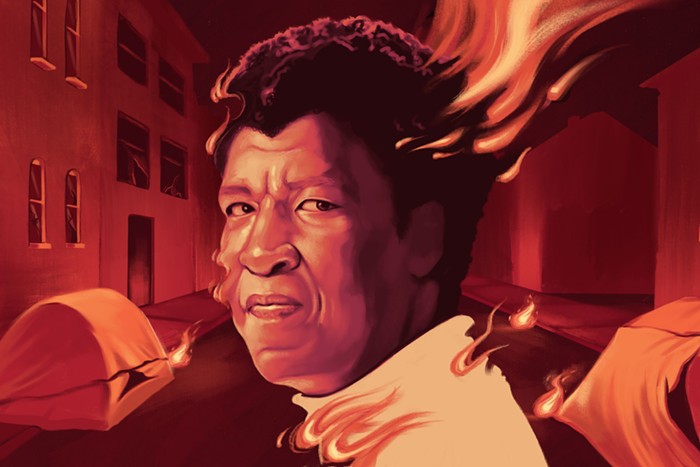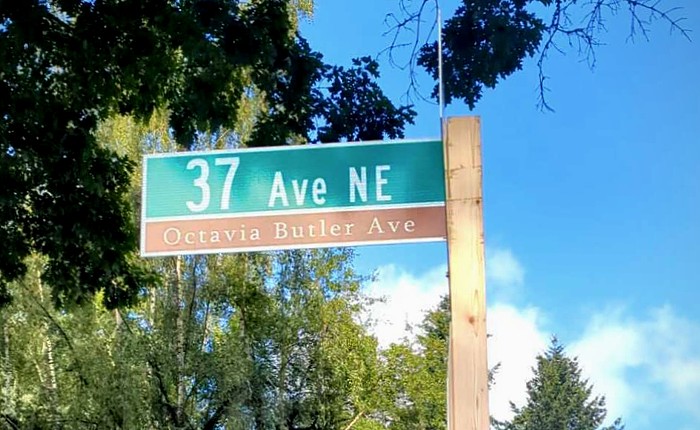
Yesterday's poem from Heather McHugh wrestled with the paradox of two independent and fundamentally alone people tying the knot. Today's poem takes the idea that love makes you "crazy" and then straps two rocket launchers onto its sides and jettisons it off into the moon, which it explodes, leaving a bright, heart-shaped cloud in the night sky forever.
You can find the poem over at Copper Nickel, and also in his collection of poetry, The 44th of July.
• First off, full disclosure: Bolina is a friend of mine, and by "a friend of mine" I mean just yesterday we spent a couple hours over Zoom talking about politics and the lack of a serious contemporary literary investigation of the scatological. My bias here is naked and unafraid, but I remain confident in the quality of this poem.
• The word "epistemic" in the title means "knowledge." People who study epistemology study how we know what we know, or where our knowledge systems come from. At the risk of being reductive, Bolina's speaker takes literally the notion that falling in love with someone reduces his entire world to just that person. But rather than mourn or feel ashamed about how small his world has become, he celebrates how much of the world is contained within this person. This person means the world to him, literally.
• The epigraph from Wittgenstein reads "If there were a verb meaning “to believe falsely,” it would not have any significant first-person present indicative." That's kind of abstract, but it makes sense. If you believed something, you couldn't think it was false. If you thought something was false, you couldn't believe in it. As Bolina's speaker will go on to demonstrate, the feeling of being in love explodes this notion.
• First, in a bit of a funny-sad joke on the presence/absence paradox, the speaker acknowledges all the pain and suffering going on in the world while at the same time admitting that the love he feels for this person is so great that he has no access to the outside world. He knows things are probably going poorly in Crimea, but because he's in love maybe they're not? Intellectually he knows that there's no such thing as "the one," but because he's in love maybe there is? The only way you can believe him is if you've ever been this in love:
In Crimea now the larks might be muzzled by artillery
and crap weather, how should I know? In Haifa now
the guns must be running, I have no idea. In Kobani,
a boy is waxing a Kalashnikov. A boy is waning
in a blood puddle, I don’t know. I’m not in Missouri.
I’m not in Humboldt Park or Harlem. I’m here with you,
wrought simple and plain happy.
• Though no formal metrical pattern governs the poem, the poet is still putting music to work. Hear how all those "h"-sounds connect those separate neighborhoods together in a poem, suggesting that one entity really can contain the whole world, just as a single line can contain New York and Chicago and wherever the poem is located.
• The speaker pretty much continues in this mode, showing just how much of the world, both real and imagined, this person contains. Hard not to stand up and just start clapping when you read these lines:
If it isn’t written by you, I won’t read it. If it isn’t about you,
I won’t know it, and I won’t call you bunny or sweetheart
or pumpkin now I know you are my wild earthquake,
my ontological kazoo, my dizzy robin of ghost feathers,
your voice is a brontosaur. It’s bigger than everything.
• In the last section of the poem, the speaker references and humorously one-ups both Eliot's "The Love Song of J. Alfred Prufrock" and Keats's "Ode on a Grecian Urn." This speaker doesn't wonder if he should eat a peach, he absolutely dares to eat a peach, because, after all, his partner is the universe. And if it turns out that all of the world is "a false front or a figment / of a dog’s eye in another universe," then it doesn't matter. "I don’t need to know now / I know you I don’t know and I don’t need know." In this line, Bolina collapses Keats and Wittgenstein. In his poem, Keats's urn says beauty is truth, and Keats says that's all anyone knows and all anyone needs to know. Bolina points out that the urn and the people looking at it might be an object in a dog's daydream, so they might also need know that, but he ends up basically siding with Keats in the negative sense: all Bolina's speaker needs to know is this love of this person, and he doesn't even need to know what he doesn't know, because his partner contains all those mysteries now. Of course, intellectually he knows that's not true, but he's so in love that he feels it's true, and that's all he really need know.



















